Analysis |
Share in Facebook
Share in Twitter
Send in e-mailSend in e-mail
SaveSave article to reading list
Zen Read
Print article

SUBSCRIBE NOW
Open gallery view
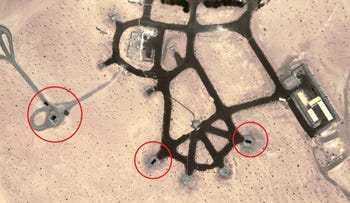
Two Barak launchers, in the United Arab Emirates, in a satellite photo from September.Credit: Google Earth

Amos Harel
Get email notification for articles from Amos HarelFollow
Oct 30, 2022
Satellite photos published over the weekend divulged one of the Middle East’s best-kept secrets: Israel has delivered a battery of the Barak missiles it makes to the United Arab Emirates, which have been deployed around Abu Dhabi. These photos came in the wake of a report from last month, published by Reuters, according to which the UAE has also purchased some Israeli Spyder missiles.
These Israeli air defense systems are intended to defend the UAE against the threat of Iranian-made drones, some of which are operated by the Houthi rebels in Yemen. Earlier this year, the Emirates were targeted several times by the Houthis, significantly disturbing Gulf state leaders. In January, three Emirati citizens were killed in an attack on Abu Dhabi. Further attacks occurred in the following months. In April, unusual traffic by large transport planes was recorded between the Emirates and Israel’s Nevatim air base.
It seems that Israel extended military aid to the Emirates at a time when it was needed urgently, while no other friendly country, including the United States, stepped in to deliver such aid. The transfer of Israeli anti-drone systems reflects the tightening relations between the two countries, a continuation of the Abraham Accords, which were signed at the initiative of the Trump administration more than two years ago. The Biden administration is trying to continue his predecessor’s move, with the formation of a regional air defense system against missiles and drones, but at this stage there are only preliminary contacts and initial joint exercises, not a comprehensive system of cooperation between the U.S., Israel and conservative Sunni states that are rivals of Iran.
More than the events in the Middle East, Iranian aid to Russia and the supply of drones for its war in Ukraine have raised concerns about offensive drones, putting them in the center of the world’s agenda. One reflection of this is a special session by the UN Security Council, convening this weekend in India. The session is dealing with three rising threats in the international arena: drones, cyberattacks and the use of cryptocurrency, all of these in connection with the potential for use in terror attacks.
Please enter a valid email address
Sign Up
David Scharia, chief of the UN Security Council Counter Terrorism Executive Directorate, says meetings held in Mumbai and in New Delhi were attended by ministers and ambassadors of countries that are currently members of the Security Council. The council formulated a unified policy and a comprehensive plan of action for restricting the use of drones for terror attacks, having already defined drones as a major threat to the international “war on terror” back in 2019. According to Scharia, “there is an understanding that something new and worrying is taking shape. Experience shows that almost every conflict brings with it new modes of operation.”
Open gallery view
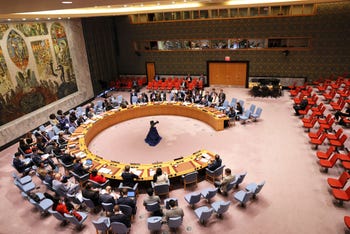
The UN Security Council holds a meeting at the United Nations Headquarters in New York City this October.Credit: Michael M. Santiago - AFP
- Advertisment -
Play
Loaded: 7.42%
Remaining Time -8:03
Unmute
×
Early Friday morning, shots were fired at a military position near the Hawara checkpoint, at the southern entrance to Nablus. No one was hurt, but an IDF force that had set up an ambush nearby opened fire at two Palestinian vehicles passing by. Two of their passengers were killed and another badly wounded. According to Palestinian sources, the two dead men were members of the Palestinian Authority’s security forces. Video footage from one of the cars that was hit shows shells from bullets fired by light weapons inside the vehicle, which could mean that shots were fired at the IDF position from that car.
Open gallery view
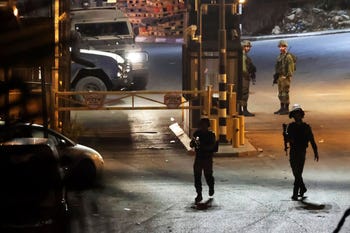
Israeli security forces patrol an area of a gun attack near Kiryat Arba in the West Bank on Saturday night.Credit: HAZEM BADER - AFP
If the men killed were the ones who had fired at the position, this would be another instance of the recent involvement of these security forces in violent clashes with the IDF. Since the latest clashes between the IDF and the Lions’ Den group, increased efforts by Palestinian Authority forces to take control of the city have been noted, with some willingness to confront such groups evident. The IDF admits, however, that the PA has greater difficulties in contending with a phenomenon that is perceived as an extensive popular movement, without a connection to its direct internal rival, Hamas.
Even though Hamas has given members of the Lions’ Den substantial financial assistance, the group has maintained its independence and did not submit to directives by the more veteran organization. Hamas, along with Islamic Jihad, are acting the same way with regard to other local organizations in the making. Israel is perceiving a change in the policy of these older organizations. At this stage, they are less worried about the ideology and affiliation of these groups and are focused more on results: striking at Israelis and fostering chaos in the West Bank, in the hope that this will undermine the rule of the Palestinian Authority. The IDF calls these new groups “freelancers.”
Open gallery view
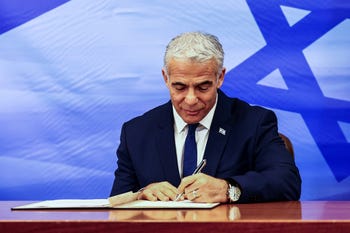
Israeli Prime Minister Yair Lapid signs a U.S.-brokered deal setting a maritime border between Israel and Lebanon last Thursday.Credit: Ronen Zvulun /AP
In the absence of any other argument to latch onto, Likud propaganda found some casual joking by Prime Minister Yair Lapid, caught by the Kan public broadcaster’s microphone, who was teasing the Biden administration’s special envoy and coordinator for energy affairs Amos Hochstein for “ruining relations with Saudi Arabia.” Lapid was referring to the U.S. difficulty in convincing the Saudis to produce more oil, but this didn’t prevent Likud from accusing Lapid of destroying Israel’s relations with Saudi Arabia, no less.
- Advertisment -
The importance of this agreement can be inferred from some of the reactions in Lebanon. Hanin Ghaddar is a veteran analyst at the Washington Institute for Near East Policy and a Lebanese citizen with Shi’ite origins. In an article on the agreement in the War on the Rocks website, she wrote that when she was growing up in southern Lebanon, the word “Israel” was taboo, unmentionable under any circumstance. “Even though we knew that this state existed and prospered beyond our southern border, Hezbollah made sure that denial was the best way of contending with that reality. If someone dared say ‘Israel,’ the immediate response was the reminder that one should use the term ‘Falastin,’ or the ‘occupying entity.’”
Please enter a valid email address
Sign Up
Ghaddar noted that in the response to the signing of the agreement, Hezbollah leader Hassan Nasrallah said that he had no problem with the agreement with Israel. She said that for many Lebanese, this indicated a significant change in the narrative and strategy. No Hezbollah leader had ever uttered the word “Israel” before. None of them were tolerant when others used that word, she said. This may have been a slip of the tongue, but one should remember this instead of mocking the significance of the agreement while describing it as an Israeli capitulation.
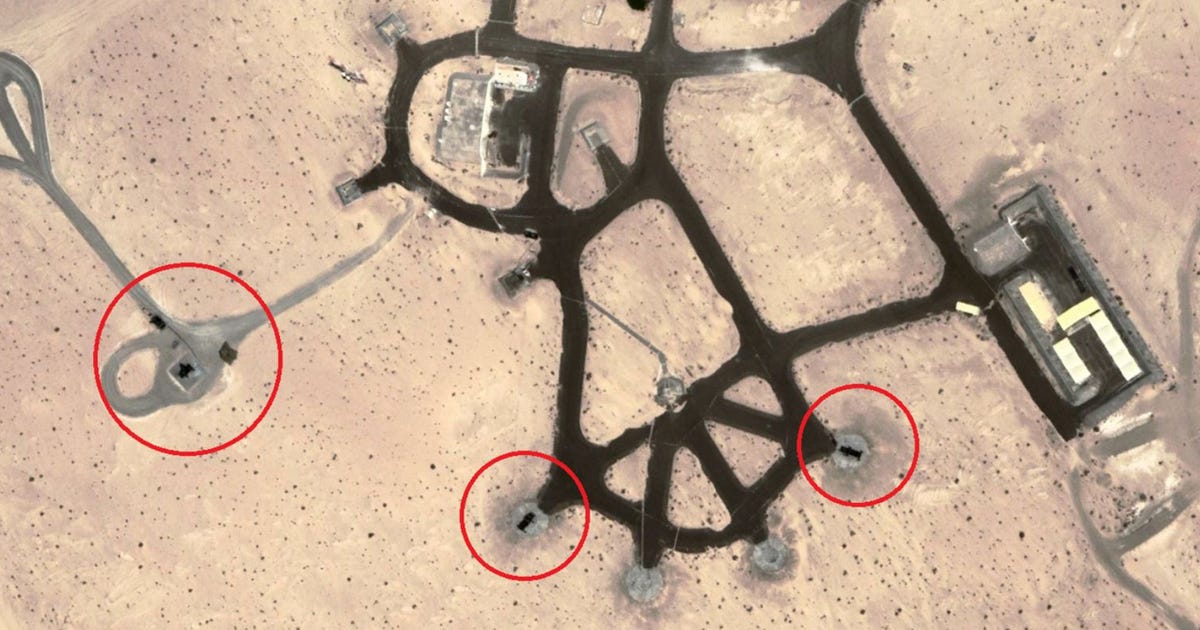
With Aerial Defense Systems, Israel Aids UAE at Crucial Moment
The supply of Israeli systems reflects both tightening relations and growing concerns over Tehran’s kamikaze dronesShare in Facebook
Share in Twitter
Send in e-mailSend in e-mail
SaveSave article to reading list
Zen Read
Print article

Want to read more?
GET FULL ACCESS TO HAARETZ. FROM ONLY $1 FOR THE FIRST MONTHSUBSCRIBE NOW
Open gallery view

Two Barak launchers, in the United Arab Emirates, in a satellite photo from September.Credit: Google Earth

Amos Harel
Get email notification for articles from Amos HarelFollow
Oct 30, 2022
Satellite photos published over the weekend divulged one of the Middle East’s best-kept secrets: Israel has delivered a battery of the Barak missiles it makes to the United Arab Emirates, which have been deployed around Abu Dhabi. These photos came in the wake of a report from last month, published by Reuters, according to which the UAE has also purchased some Israeli Spyder missiles.
These Israeli air defense systems are intended to defend the UAE against the threat of Iranian-made drones, some of which are operated by the Houthi rebels in Yemen. Earlier this year, the Emirates were targeted several times by the Houthis, significantly disturbing Gulf state leaders. In January, three Emirati citizens were killed in an attack on Abu Dhabi. Further attacks occurred in the following months. In April, unusual traffic by large transport planes was recorded between the Emirates and Israel’s Nevatim air base.
It seems that Israel extended military aid to the Emirates at a time when it was needed urgently, while no other friendly country, including the United States, stepped in to deliver such aid. The transfer of Israeli anti-drone systems reflects the tightening relations between the two countries, a continuation of the Abraham Accords, which were signed at the initiative of the Trump administration more than two years ago. The Biden administration is trying to continue his predecessor’s move, with the formation of a regional air defense system against missiles and drones, but at this stage there are only preliminary contacts and initial joint exercises, not a comprehensive system of cooperation between the U.S., Israel and conservative Sunni states that are rivals of Iran.
More than the events in the Middle East, Iranian aid to Russia and the supply of drones for its war in Ukraine have raised concerns about offensive drones, putting them in the center of the world’s agenda. One reflection of this is a special session by the UN Security Council, convening this weekend in India. The session is dealing with three rising threats in the international arena: drones, cyberattacks and the use of cryptocurrency, all of these in connection with the potential for use in terror attacks.
Breaking news and the best of Haaretz straight to your inbox
Email *Please enter a valid email address
Sign Up
David Scharia, chief of the UN Security Council Counter Terrorism Executive Directorate, says meetings held in Mumbai and in New Delhi were attended by ministers and ambassadors of countries that are currently members of the Security Council. The council formulated a unified policy and a comprehensive plan of action for restricting the use of drones for terror attacks, having already defined drones as a major threat to the international “war on terror” back in 2019. According to Scharia, “there is an understanding that something new and worrying is taking shape. Experience shows that almost every conflict brings with it new modes of operation.”
Open gallery view

The UN Security Council holds a meeting at the United Nations Headquarters in New York City this October.Credit: Michael M. Santiago - AFP
- The worrying secret behind Israel-UAE ties
- Two years after Abraham Accords, why the UAE F-35 deal remains grounded
- How Israel and Saudi Arabia plan to down Iranian drones together
‘Freelancers’
In the West Bank, more members of the Lions’ Den group in Nablus have given themselves up to Palestinian security services. It appears that Israel’s manhunt after group members and the deaths of six of its activists in Nablus in two incidents last week have led to this unusual decision. Meanwhile, there have been attempted attacks in the Nablus area, possibly attesting to an intent to take revenge.- Advertisment -
Play
Loaded: 7.42%
Remaining Time -8:03
Unmute
×
Early Friday morning, shots were fired at a military position near the Hawara checkpoint, at the southern entrance to Nablus. No one was hurt, but an IDF force that had set up an ambush nearby opened fire at two Palestinian vehicles passing by. Two of their passengers were killed and another badly wounded. According to Palestinian sources, the two dead men were members of the Palestinian Authority’s security forces. Video footage from one of the cars that was hit shows shells from bullets fired by light weapons inside the vehicle, which could mean that shots were fired at the IDF position from that car.
Open gallery view

Israeli security forces patrol an area of a gun attack near Kiryat Arba in the West Bank on Saturday night.Credit: HAZEM BADER - AFP
If the men killed were the ones who had fired at the position, this would be another instance of the recent involvement of these security forces in violent clashes with the IDF. Since the latest clashes between the IDF and the Lions’ Den group, increased efforts by Palestinian Authority forces to take control of the city have been noted, with some willingness to confront such groups evident. The IDF admits, however, that the PA has greater difficulties in contending with a phenomenon that is perceived as an extensive popular movement, without a connection to its direct internal rival, Hamas.
Even though Hamas has given members of the Lions’ Den substantial financial assistance, the group has maintained its independence and did not submit to directives by the more veteran organization. Hamas, along with Islamic Jihad, are acting the same way with regard to other local organizations in the making. Israel is perceiving a change in the policy of these older organizations. At this stage, they are less worried about the ideology and affiliation of these groups and are focused more on results: striking at Israelis and fostering chaos in the West Bank, in the hope that this will undermine the rule of the Palestinian Authority. The IDF calls these new groups “freelancers.”
A sign of change
Media attention to the maritime border agreement between Israel and Lebanon subsided almost immediately after it was signed last Thursday. Likud Chairman Benjamin Netanyahu was willing to risk pulling back from the deal, and the resulting military confrontation with Hezbollah, just so the current government would not chalk up a diplomatic achievement. But he stopped assailing the agreement after discovering that the Israeli public was not particularly interested in the details of the agreement and unbothered by them.Open gallery view

Israeli Prime Minister Yair Lapid signs a U.S.-brokered deal setting a maritime border between Israel and Lebanon last Thursday.Credit: Ronen Zvulun /AP
In the absence of any other argument to latch onto, Likud propaganda found some casual joking by Prime Minister Yair Lapid, caught by the Kan public broadcaster’s microphone, who was teasing the Biden administration’s special envoy and coordinator for energy affairs Amos Hochstein for “ruining relations with Saudi Arabia.” Lapid was referring to the U.S. difficulty in convincing the Saudis to produce more oil, but this didn’t prevent Likud from accusing Lapid of destroying Israel’s relations with Saudi Arabia, no less.
- Advertisment -
The importance of this agreement can be inferred from some of the reactions in Lebanon. Hanin Ghaddar is a veteran analyst at the Washington Institute for Near East Policy and a Lebanese citizen with Shi’ite origins. In an article on the agreement in the War on the Rocks website, she wrote that when she was growing up in southern Lebanon, the word “Israel” was taboo, unmentionable under any circumstance. “Even though we knew that this state existed and prospered beyond our southern border, Hezbollah made sure that denial was the best way of contending with that reality. If someone dared say ‘Israel,’ the immediate response was the reminder that one should use the term ‘Falastin,’ or the ‘occupying entity.’”
Breaking news and the best of Haaretz straight to your inbox
Email *Please enter a valid email address
Sign Up
Ghaddar noted that in the response to the signing of the agreement, Hezbollah leader Hassan Nasrallah said that he had no problem with the agreement with Israel. She said that for many Lebanese, this indicated a significant change in the narrative and strategy. No Hezbollah leader had ever uttered the word “Israel” before. None of them were tolerant when others used that word, she said. This may have been a slip of the tongue, but one should remember this instead of mocking the significance of the agreement while describing it as an Israeli capitulation.


